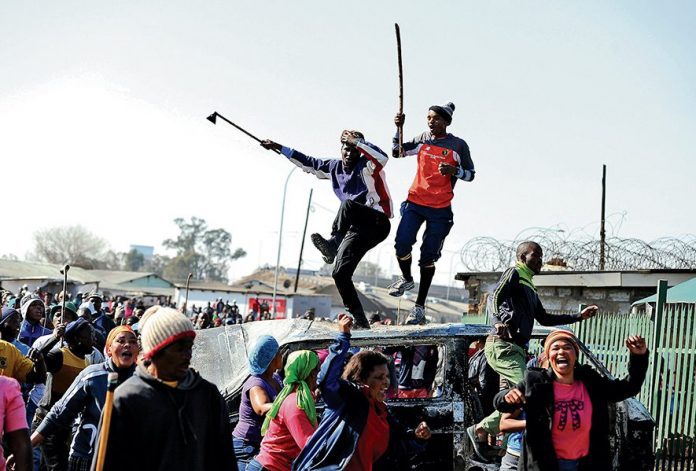Johannesburg- There have been at least 4 700 protests, strike actions or crowd-related public violence across South Africa since the last local government polls were held in 2016, according to data from the Institute of Security Studies’ (ISS) protest and public violence monitoring project.
Lizett e Lancaster, the manager at the crime and justice information hub at the ISS, said there was likely an undercount in their numbers because not all incidents were reported by the media and other sources.
She added that communities took to the streets over municipal service issues, policing, education and healthcare.
“Community groups mobilise only when government representatives and the relevant department or agency do not. The metros experience the most protests mainly because planning and service delivery has not been able to keep up with the rapid urbanisation patt erns in these areas,” she said.
[membership level=”1″]Protest action also ramped up in the lead-up to the hotly contested local government elections, slated for November 1.
Soweto protesters on Thursday blocked roads with rocks and burning tyres, protesting over electricity and houses.
Lancaster said the solutions over services delivery strikes might lie in electing suitable, competent and well-trained councillors and municipal officials.
“Cadre deployment at the expense of the people is leading to disillusioned voters. Communities respond well to councillors that communicate well and illustrate on a daily basis that their purpose is to serve and represent the community,” she said.
Cabinet during the year resolved that the Department of Cooperative Governance and Traditional Affairs (Cogta) and Treasury lead in identifying those municipalities that warrant intervention and advise on the mode of intervention that should be applied.
The identified candidates for intervention were to also include municipalities that the department needs to take over, in terms of section 139(7) of the constitution. A list of 64 municipalities were presented as dysfunctional but the focus was mainly on those in the North West.
Abahlali baseMjondolo spokesperson Thapelo Mohapi said it was painful to see communities from informal settlement having to suffer while they continued to vote for corrupt politicians who did not care about them.
“Many protests had taken place in informal settlements due to poor service delivery, and the cause of all this is corruption from politicians and their parties. We embark on protests because we have had enough of a lack of services.
At times when we protest, the government listens to us but it fails to listen to us when we engage. Once we block the roads, the government listens because it knows how badly our actions affect the economy,” said Mohapi.
Cogta spokesperson Mlungisi Mtshali said the reasons for protests remained complex and since 2016 his department had placed 30 municipalities under administration.
“The historical backlog of services, in-migration into cities, the issues of relative deprivation of those exposed to better services in an urban context, the socio-economic dynamics, and high unemployment all play a part.”
“Poor communication between citizens and the state has been found as a major catalyst of service delivery protests. Widely divergent estimates of the number of protest incidents exist because of the use of different definitions and methodological approaches.”
“Cogta uses the Municipal IQ hotspots monitor. According to this monitor, the country experienced 904 protests from 2016 to April 2021.”
Mtshali also said that for the period of 2004 to May 2020, most protests took place in Gauteng (23%), followed by Eastern Cape and Kwazulu-Natal on 17% and Western Cape (15%).
“Corruption is one of the problems experienced in some municipalities. “Service delivery protests have a negative impact as in most cases these lead to the destruction of important property and infrastructure.”
To read more political news and views, click here.
Follow @SundayWorldZA on Twitter and @sundayworldza on Instagram, or like our Facebook Page, Sunday World, by clicking here for the latest breaking news in South Africa. To Subscribe to Sunday World, click here.
Sunday World
[/membership] [pmpro_signup submit_button=”Register” level=”1″ login=”1″ redirect=”referrer” short=”false” title=”Thank you for choosing Sunday World, to read this article for free, please register below at no cost.” short=”true” custom_fields=”true”]


